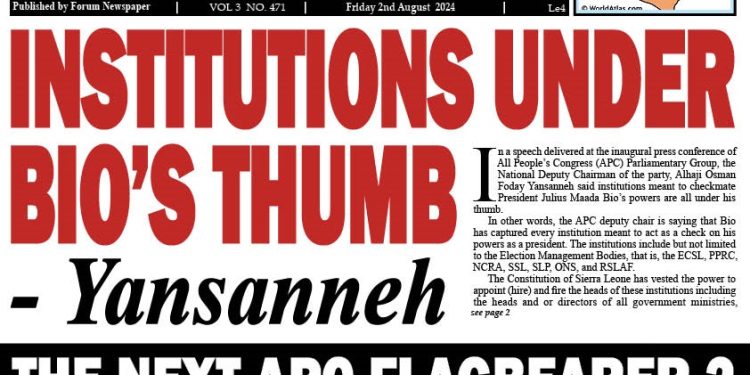In a speech delivered at the inaugural press conference of All People’s Congress (APC) Parliamentary Group, the National Deputy Chairman of the party, Alhaji Osman Foday Yansanneh said institutions meant to checkmate President Julius Maada Bio’s powers are all under his thumb.
In other words, the APC deputy chair is saying that Bio has captured every institution meant to act as a check on his powers as a president. The institutions include but not limited to the Election Management Bodies, that is, the ECSL, PPRC, NCRA, SSL, SLP, ONS, and RSLAF.
The Constitution of Sierra Leone has vested the power to appoint (hire) and fire the heads of these institutions including the heads and or directors of all government ministries, departments and agencies (MDAs) in the presidency.
In a country where private sector jobs are few and hard to come along, the president, as head of the biggest employer in our economy – the government – one can say has quiet effectively used this power to instead keep these men and women in check and bending to his will thereby enabling him to pretty much do as he pleases.
It is worthwhile and noteworthy, for the import of this write up to sink well, to clarify the extent of Mr Bio’s power and hold over these people who are supposed to be working in the interest of the people, state and for the integrity and strength of the institutions they head.
There are three arms or branches of government, the legislature (Parliament), the judiciary (the courts) and the executive (the presidency). There are also members of the Fourth Estate in government, the media, who relay news on the happenings and individuals that work in the three branches thereby providing effective checks on their plans and actions.
The judiciary is probably the most important arm of government as it upholds and interprets the meaning hence spirit of the law as they apply to all occasions, and when these people do their job effectively, it acts as a deterrence to would be copycats of those who fall foul of the laws enacted in the House of Parliament. Sierra Leone and Sierra Leoneans have long had a problem respecting the rule of law, whose impunity has so water down the true meaning of the law that the law is routinely trampled by anyone liquid or well off enough to buy their way out of legal issues.
The president appoints or hires the head of the judiciary, the Chief Justice, who among other things plays a crucial role in the scheduling of cases for prosecution by the state.
The head of the Parliament is chosen by MPs. However, the Speaker in a roundabout way is suggested by the ruling party government, whose leader is the president of the state.
At the magisterial level, the citizenry’s chances of getting their cases heard is at the mercy of the Inspector General of Police (IGP), who decides if a case should be sent to the Law Officers Department for advice. The president also appoints (hires) the police chief.
All of those appointed by the president to head public institutions are subject to approval by the Members of Parliament.
The case of the 10 duly elected Members of the Fifth Parliament belonging to the main opposition is one that still speaks to the complicity of the president and the men or people he hires to subvert the rule of law and is a constant reminder to the main opposition and the country of how little we can trust that the judiciary including the Attorney General would give proper advice on adherence to the rule of law and procedures.
These men were unconstitutionally denied their place in the Fifth Parliament (2018 to 2023) by the executive using the courts to remove them instead of applying the constitutional provision for the settling of electoral disputes. Up to present their petitions to have their cases heard in a court of law are still collecting dust in the Chief Justice’s office. As we are presently in the Sixth Parliament (2023 to 2028) any chance or hope of getting their cases heard is futile.
Although no one in spirit would say that the president should not have power to hire or fire based on the rule of law, but his hiring power over the heads of the election management bodies – ECSL, PPRC, NCRA, SSL, SLP, ONS, and RSLAF in our setting and based on ample historical evidence of the executive meddling in the execution of their job (especially before, during and after the conduct of the 24 June 2023 election) implores us to beg they be reconsidered in light of the alleged constitutional review process already in motion in the House of Laws.
According to the Deputy Chairman of the APC the heads and work of other employees of these institutions have been compromised and bought over by the government, which is headed by the president.
In order to help bolster his and the chances of party members winning elections at any and all cost, president Bio depends on the head of the ECSL and others from the regions to ensure that either unwanted votes aren’t counted, certain people are disenfranchised or ballot boxes stolen – which falls under the purview of the Sierra Leone Police – SLP to get the president’s wishes granted.
Because the police are weak at crowd control and cannot guarantee that they will not shoot and or kill upset crowds of people, members of the Republic of Sierra Leone Armed Forces – RSLAF are incorporated to assist the police to maintain law and order during elections and other events that could threaten the security of the state.
Working in the interest of their respective bosses, the IGP and Chief of Defence Staff – CDS, the cops and soldiers work against members or supporters of the opposition to keep their bosses in the president’s good books and in his good graces. The country’s ambition of a flourishing and credible democracy is sacrificed on the altar of contending self-interests.
Meanwhile, the drama of head of the ECSL, Chief Commissioner Mohamed K. Konneh’s continued insistence that he won’t release or give access to the disaggregated voting data per polling station is predicated on impunity informed by his knowledge and belief that he will not be prosecuted since the state’s prosecutors, the IGP and Attorney General (who is also the Minister of Justice), also hired by the president, are not going to have the audacity to bring charges against him although his refusal is in clear violation of our election laws.
The people of Sierra Leone are really left in the lurch, which is truly sad. Compounding their lot since they cannot rely or depend on the abovementioned institutions to protect their votes in our democracy, the only public or private set of people that can also speak out on their behalf also have financial and other reasons to consider before and if they decide on speaking up or against the abuse of the people’s trust and hope in the upholding or execution of the rule of law.
Members of the media, seen as the Fourth Estate in the governance of the state, are forced to take sides in order to either avoid being summarily and indiscriminately arrested and locked up without charges, attacked by people or thugs associated with the incumbent and his party, no longer getting government advertisement or placements or getting invited by the IMC, whose head and other commissioners are appointed by the president, on accusations of inciting rebellion and fined stupendous sums of money that could see you shutting down your newspaper.
Aware of the power of the media, particularly social media, the head of state working through the Minister of Information and the heads of communications in the MDAs advert-starve newspapers seen as advocating for change and strict adherence to democratic principles and the application of the rule of law in the work of our elected and appointed leaders.
In Sierra Leone it is not uncommon for newspapers and other media houses to find themselves being side-lined from receiving government MDA advert placements. With newspaper sales low, media houses depend on adverts to stay afloat and pay the bills and staff members.
Those that manage to publish regularly can have their publishers jailed for days and released without charges for publishing articles, editorials, commentaries, opinion pieces government deems to being against the ruling party or their surrogates. The same, meanwhile, works for heads of CSOs, CBOs and NGOs.
Lack of funding to carry out their advocacies has seen the heads of many such organisations openly courting the government of the day with hopes of receiving funding assistance from government or the head of state, which action put the credibility and effectiveness of their advocacy under a cloud of suspicion.
Other group or organisation of people that should act as the society’s moral guarantors, religious organisations, the intelligentsia at universities trained in governance and related fields fail to speak up and out against government or our president’s excesses for the same considerations as the aforementioned people or groups.
How can the nation then free herself from the oppression of the head of state via cash violence or consideration for your job and personal safety? While there can be many answers to this question, the surest way is for us as a people to be selfless in our reviewing of the president’s many powers to appoint people meant to act as checks to his powers, impress it on those he hires to do their jobs based on their terms of references and holding the constitution sacred thereby putting the rule and application of the law above the desires and ambitions of the leader of the people.










